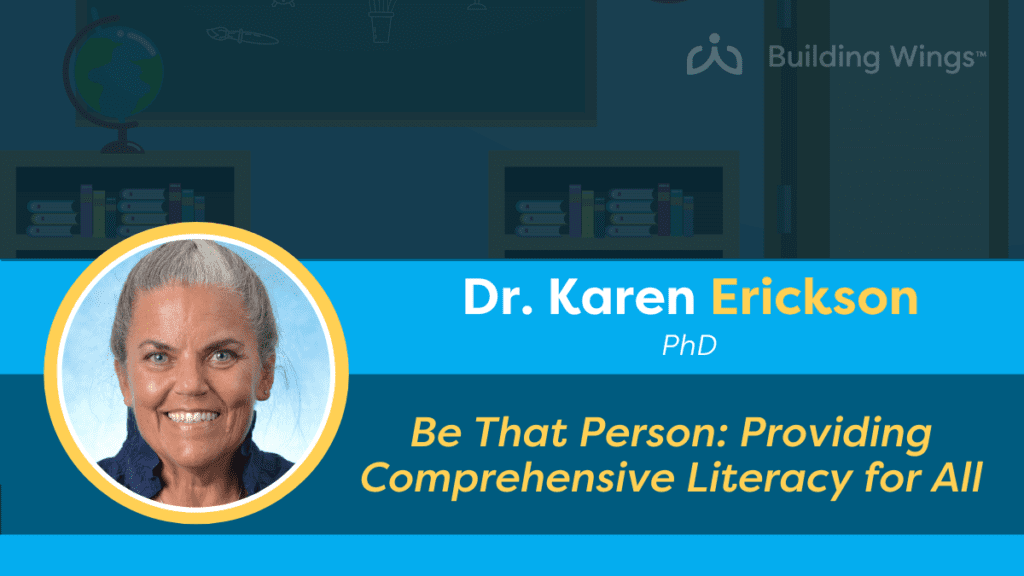Be That Person:
Providing Comprehensive Literacy Instruction
for All
Karen Erickson, Ph.D.,
calls for age-respectful and ability-appropriate learning
for students with complex learning needs and for educators to
“Be That Person.”
During a previous literacy summit, Karen Erickson, Ph.D., addressed attendees with a keynote presentation titled “Be That Person: Providing Comprehensive Literacy Instruction for All.”
Karen’s discussion points are summarized below and her presentation, with an introduction by Don Johnston, can be viewed here:
What is comprehensive literacy instruction?
In her presentation, Erickson reviewed the conventional approach to teaching literacy, which works in a sequential fashion that has students master skills before moving on to learn new concepts. This linear method of instruction privileges some elements of reading and writing over others.
Comprehensive literacy instruction, in contrast, teaches competencies in an integrated way, in language-rich learning environments where instruction is systematic, explicit, and balanced, addressing all necessary elements of literacy rather than prioritizing some over others.
The need for comprehensive literacy instruction became apparent in the late ’90s and early 2000s, when researchers found that teachers weren’t explicitly teaching reading and writing skills. Rather, they were pointing to printed words and symbols and considering it literacy instruction. While supporting expressive communication is integral to literacy development, it on its own will not drive outcomes. Researchers and educators began to realize that teaching small, discrete skills was less effective than using an integrated approach that teaches all of the elements together.
The Impact of ESSA
When then-President Obama signed the Every Student Succeeds Act (ESSA) at the end of 2015, the definition of comprehensive literacy was refined to include:
- Developmentally appropriate
- Contextually specific
- Systematic in instruction, including frequent practice of reading and writing
Instruction also needed to meet state-defined grade-level standards that were age-respectful and ability-appropriate. In other words, a 12-year-old with complex learning needs required instructional content that met seventh grade standards, rather than kindergarten ones.
Erickson is quick to point out that ESSA assumes conventional reading and writing instruction begins in first grade. Indeed, most students in public schools are conventionally literate by the time they’re six years old. Students with complex disabilities tend to require more time and instruction.
How to teach emergent literacy learners
Erickson describes emergent literacy as “all the reading and writing individuals do before they read and write in conventional ways.” It reflects an incomplete understanding of form and convention. Emergent literacy is not age dependent; rather, it’s dependent on opportunity and experience.
To begin comprehensive literacy instruction for students with complex learning needs, Erickson asserts, learners need to see themselves as learners with agency and ability. When beginners have opportunities to find success, they’re more likely to engage meaningfully in the practice of reading and writing.
Rather than test students at the outset to determine their skill level, Erickson says, educators should instead ask four questions:
- Does the student know most of the letters most of the time?
- Does the student engage actively during shared reading?
- Does the student have a symbolic means of communication and interaction?
- Does the student understand that writing involves letters and words?
If the answer to one or more questions is “No,” then an educator should use a comprehensive emergent literacy intervention.
Erickson also emphasizes the importance of a routine-based approach that exposes students to phonological awareness, decoding, vocabulary, language structure, reading fluency, reading comprehension, and writing with purpose. Additionally, she encourages educators to move away from “sight-word recognition,” as studies have indicated that learning words in isolation doesn’t support long-term reading and writing development. She recommends using curriculum built around comprehensive literacy instruction, such as Readtopia and ReadtopiaGO to provide the appropriate scaffolding, regularity, and engagement for students.
Be That Person
Fundamental to any student’s success, says Erickson, is having a person who believes that the student can learn to read and write. While large, supportive teams are ideal, even having just one champion can transform a learner’s entire experience. And for parents who have taken on the role of teacher for their children, Erickson has one final message: imperfect practice is better than no practice at all.

Karen Erickson, Ph.D. is the Director, Center for Literacy and Disability Studies, Yoder Distinguished Professor Department of Allied Health Sciences, Professor, Division of Speech and Hearing Sciences at University of North Carolina, Chapel Hill
Interested in how Readtopia can benefit the educators and learners at your school or district? Contact us for additional information.

